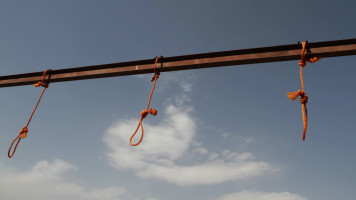'Caught in the middle': Unregistered refugees in Egypt face risk of jail or deportation to war zones
A recent government decision that gave a grace period for refugees and asylum seekers to legalise their residence in Egypt is believed to have, arguably, endangered many foreign nationals who had sought refuge in the country after fleeing war zones.
Over the past 48 hours, security campaigns have been launched in the capital, Cairo and areas elsewhere in the country known for having large gatherings of people from refugee communities. Reportedly, many undocumented individuals were arrested.
The government recently announced that foreign nationals must pay US$1,000 each to be allowed to legally live in Egypt. Any refugee or undocumented immigrant with no valid residence permits are at risk of deportation.
The controversial decree, put into effect as of 30 June, mostly impacted distressed Sudanese nationals who fled an unforgiving civil war at home.
A Sudanese national, who entered Egypt shortly after the war broke out, told The New Arab that he had already sought asylum through the UN Refugee Agency (UNHCR) in Cairo before paying US$4,000 to the government for himself and his three-member family for the residency fees.
"But now after the war continued in Sudan, and we are forced to renew our residence permit, we feel as if we are caught in the middle where we are demanded to pay a fortune to stay in Egypt or else we will be forced back to a living hell," said Haider, who asked to be referred to by his first name for safety reasons.
In case a residence permit of a foreign national expires, s/he cannot access bank accounts, use a mobile phone line, receive treatment at public healthcare facilities or acquire any official documents.
Racism, everywhere
In recent months, xenophobia and anti-refugee sentiments have flourished in Egypt, especially against Sudanese citizens, after the country witnessed a significant influx of refugees, with Egyptians accusing them of exacerbating the current economic crisis.
From social media platforms to mainstream talk shows, derogatory and inflammatory rhetoric against Sudanese is omnipresent.
An asylum seeker, named Fatima, said that she and her family have been antagonised and harassed by Egyptians and even other by other refugees, including Syrians.
"We are forced to remain silent and tolerate whatever happens to us because we cannot file police reports or officially complain about any abuses we are subjected to since we have no legal status or else we will be expelled," Fatima, also asking to be referred to by her first name for similar reasons, told TNA.
Dark-skinned Egyptians have also been at risk of harassment at security checkpoints for being mistaken for Sudanese nationals or refugees from other nations in Africa.
No official record or data of arrests of refugees has been released by authorities, while the Sudanese embassy in Cairo could not be reached for comment at the time of publication.
While there are no official estimates of the number of refugees residing in Egypt, it is believed that the country has been hosting over 600,000 registered refugees of different nationalities and ethnicities.
Local news reports estimates of foreigners living in the country under different statuses ranges from 7 million to 11 million, belonging to more than 130 countries, among a population of about 106 million Egyptians.
Like many other refugees, Haider complained about the rising prices of flats in Egypt due to the high demand, which further added to the antagonisation of Egyptians who have been impacted by the situation.
After the deadline imposed by the government for foreign nationals living in Egypt to legalise their residence, asylum seekers and undocumented refugees are now at risk of either imprisonment or deportation.
"Not only are we at risk of deportation any moment now, but we are also being antagonised by our Egyptian neighbours whenever we go down the street, which makes life intolerable," she, sadly, added.
Nowhere else to go
Even for those who apply for refugee status at the UN and their residence permit expires before receiving approval, their presence in the country remains illegal.
"The UN refugee agency receives has been asylum seekers surpassing its capacity, so many face delays and the risk of deportation if their visas are not renewed," a source inside the agency told TNA on condition of anonymity for not being authorised to talk to the media.
Lawyer Ashraf Milad Ruxi begs to differ, however.
"Those who did not have their residence legalised will most probably be deported. The question now is where they would go, given that they fled war. Legally, a would-be refugee should be given the chance to either go back home or seek asylum elsewhere," Rux, who is an expert in asylum cases, told TNA.
"Immigrants or persona non grata in Egypt who entered Egypt via illegal means due to war or endangerment in the country of origin, as per article 33 of the Geneva Convention, are supposed to be exempted from any penalties and considered a refugee," he added.
Last month, dozens of Sudanese refugees, including elderly citizens, women, and children, died from sunstroke and dehydration, as they attempted to cross into Egypt via Aswan inside open trucks facilitated by smugglers during a heat wave. About 700 others were arrested and deported via Egypt's southern Aswan province, bordering Sudan.
Before war broke out in Sudan in April last year, Egypt required only Sudanese men between the ages of 16 and 49 to obtain an entry visa. Women, children, and the elderly were exempted from this rule.
But as the number soared, Egypt changed regulations in which all Sudanese nationals, regardless of age or gender, must obtain a visa that took three to four months to be acquired. The Egyptian authorities justified the new measure to help limit "illegal activities," including fraud.
Most recently, the Egyptian authorities shut down several Sudanese schools in Cairo and private tutoring centres teaching Sudanese curricula, apparently for operating without a licence.
Another incident involved a Sudanese physician, who announced on social media he was making house calls to perform female genital mutilation (FGM), a practice deemed illegal in Egypt in recent years.
Earlier last month, Amnesty International accused Egypt of allegedly committing human rights violations en masse against undocumented Sudanese refugees, who fled the war-ravaged neighbouring Sudan, calling on the government to immediately cease the alleged "mass arbitrary arrests and unlawful deportations of Sudanese refugees," who sought sanctuary in Egypt.



